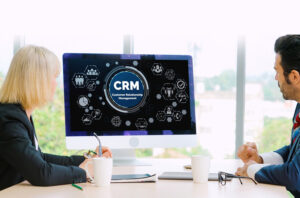CRM stands for “Customer Relationship Management” and is a software solution that allows business owners to conveniently track all communications and cultivate connections with leads and clients. CRM software for small businesses replaces the plethora of spreadsheets, databases, and apps that many firms use to maintain customer data. This tool in companies that use CRM centralizes all of the data from sales leads and clients. It also aggregates all communications (form fills, phone calls, emails, text messages, and meetings), documents, quotes, transactions, and tasks related to each lead and client. The entire team can access those facts at the appropriate time – to close a deal or provide exceptional service.
Business Impact of CRM

Customer Relationship Management (CRM) has had a dramatic impact on businesses, altering how companies that use CRM communicate with their customers and manage relationships. CRM solutions enable firms to centralize and organize client data, resulting in a comprehensive view of interactions across several touchpoints. This full awareness allows for individualized and targeted communication, establishing stronger bonds and increasing client satisfaction. CRM systems also improve internal operations, increasing efficiency in sales, marketing, and customer service. Companies that use CRM may streamline their workflows and deploy resources more effectively by automating repetitive tasks, tracking leads, and improving team collaboration. CRM analytics data also enable strategic decision-making by allowing organizations to discover patterns, forecast sales, and fine-tune their strategy.
Companies that use CRM

CRM software, or customer relationship management software, is a platform that integrates several corporate departments such as customer care, marketing, and sales. CRM software’s major goal is to increase access to and organization of customer data in order to develop stronger relationships. Every department has simple access to the client information they require.
Because everyone is on the same page, business processes may be better coordinated to enhance the customer experience throughout the purchasing cycle. Zoho Corporation, Salesforce, HubSpot, and Pipedrive are among the leading CRM software vendors today. Salesforce is the industry leader, with a 23.8% CRM market share!
According to Fortune Business Insights, the CRM market will continue to rise in the near future. The use of CRM has increased dramatically after the COVID-19 epidemic. The global CRM industry is anticipated to be worth roughly $128.9 billion by 2028.
If you are a SAAS marketer or a tech marketer or you deal in CRM Consultation Services then a list of companies using CRM will be beneficial for you. Let us take a look at top companies that use CRM.
Top Companies that use CRM

CRM is the world’s fastest-growing market today. Companies desire real-time data insights about their customers since cloud and mobile solutions are leading the way. As a result, accessibility is the primary engine of growth. As surprising as it may seem, virtually thousands of businesses worldwide use CRM software. Let’s take a look at the top 10 US companies that use CRM.
Coca-Cola:
Coca-Cola has a long history of using CRM to not only manage its relationships with consumers but also to adapt its product offerings based on changing tastes and preferences. The company employs sophisticated data analytics to gain insights into consumer behavior, allowing for targeted marketing campaigns and product innovations.
Wells Fargo:
Wells Fargo leverages CRM to provide a seamless and personalized experience for its banking customers. Through CRM, the bank can tailor financial services, offer relevant products, and ensure efficient communication. This approach strengthens customer loyalty and satisfaction in the highly competitive financial sector.
Amazon:
Amazon’s success is built on its customer-centric approach, and CRM plays a crucial role. The company employs advanced algorithms to analyze customer data, enabling personalized recommendations and a user-friendly shopping experience. Amazon’s CRM strategy contributes to its position as a global e-commerce leader.
Apple:
Apple’s ecosystem, including products like the iPhone, iPad, Mac, and services like iCloud, relies on CRM to provide a seamless and integrated experience for users. By understanding customer preferences and behaviors, Apple continuously refines its products and services to meet the evolving needs of its user base.
Xtreme Lashes:
In the beauty industry, Xtreme Lashes utilizes CRM to maintain detailed customer profiles, track appointment histories, and personalize beauty services. CRM is essential for the brand to offer customized lash extensions and beauty treatments, enhancing the overall client experience.
Activision:
Activision uses CRM to engage with the diverse gaming community. Through player data analysis, the company tailors in-game experiences, offers personalized content, and designs targeted marketing campaigns. This customer-centric approach has contributed to Activision’s success in the competitive gaming industry.
Tesco:
Tesco’s use of CRM extends beyond traditional retail. By analyzing customer data, Tesco tailors promotions, optimizes inventory management, and enhances the overall shopping experience. The company’s loyalty program, Clubcard, is a testament to its commitment to customer satisfaction and retention.
McDonald’s:
McDonald’s leverages CRM to understand customer preferences and habits. From personalized promotions to digital ordering and delivery services, CRM helps McDonald’s stay connected with its customer base. This adaptability is crucial in an industry where consumer tastes and preferences are continually evolving.
Uber:
Uber’s success in the ride-sharing industry is partly attributed to its effective use of CRM. The platform uses customer data to optimize ride matching, tailor promotions, and enhance safety features. CRM plays a pivotal role in Uber’s mission to provide a convenient and personalized transportation experience.
Zara:
Zara’s fast-fashion model relies on CRM to understand rapidly changing fashion trends. By analyzing customer data and feedback, Zara can quickly adapt its inventory and supply chain to meet consumer demands. This agility sets Zara apart in the fashion retail industry, where speed and responsiveness are key.
How to get a verified CRM customers list
Finding contact information for CRM users can be a difficult but necessary effort for organizations looking to grow their network or market their products and services. Exploring industry-specific directories, business forums, and social media platforms where organizations can exchange their information is one useful strategy. Furthermore, utilizing professional networking sites such as LinkedIn can provide significant insights into the key decision-makers within these firms. It’s critical to stay up to date on industry events, webinars, and conferences where CRM users may be present. Consider using specialized databases, such as Span Global Service’s CRM Users’ list, which provides a curated collection of contact information for firms that rely on CRM. This targeted list can substantially speed up the process by giving accurate and up-to-date information.


